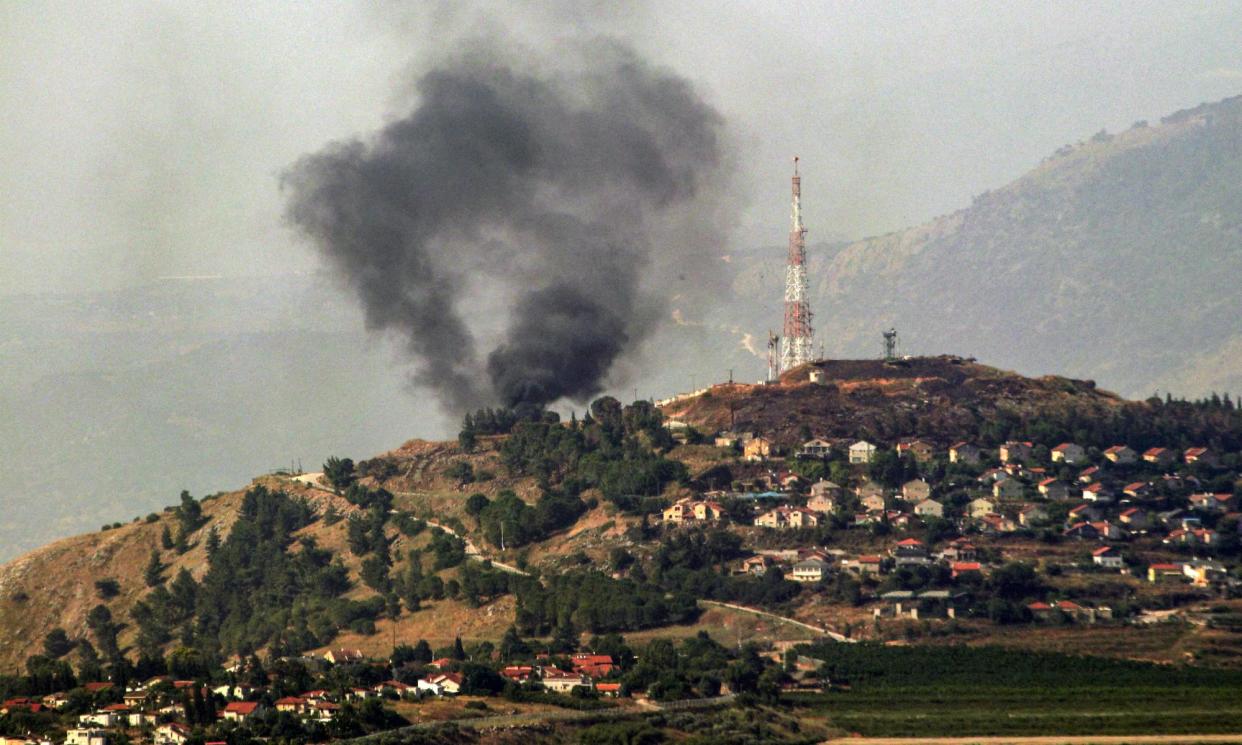US envoy visits Israel for talks aimed at averting deeper conflict with Hezbollah

A senior envoy from the Biden administration has met Benjamin Netanyahu for talks aimed at averting a deepening conflict between Israel and the Lebanese militant group Hezbollah, after Israel warned over the weekend that it was on the brink of a “wider escalation”.
Amos Hochstein has spent months in largely behind-the-scenes diplomacy in an attempt to quieten tensions between Israel and Hezbollah. Since the war in Gaza began in October, there have been worsening daily exchanges of fire, and tens of thousands of civilians have been displaced on both sides of the “Blue Line” between Israel and Lebanon.
Related: What is Hezbollah’s role and influence in Lebanon?
Over the weekend, the UN special coordinator for Lebanon, Jeanine Hennis-Plasschaert, and the head of the UN peacekeeping forces in Lebanon, Aroldo Lázaro, said in a joint statement that they were “deeply concerned” about the escalation along Lebanon’s border, describing the “very real” risk that a miscalculation along the southern border could trigger a wider war.
That warning was underlined on Monday when Israel assassinated a Hezbollah commander in his car near the southern Lebanese city of Tyre.
Hochstein met Netanyahu and the Israeli defence minister, Yoav Gallant, on Monday before flying to Lebanon where he will meet Nabih Berri, the octagenerian speaker of the Lebanese parliament and leader of the Amal movement, who has represented Hezbollah’s views to western interlocutors.
There is growing anxiety in Washington and elsewhere over the risk of a serious escalation between the two sides, not least after Israel’s killing last week of Taleb Abdallah, the most senior Hezbollah commander to be targeted so far.
The killing prompted Hezbollah to fire hundreds of rockets and drones at northern Israel in the heaviest barrages since the Lebanese group began firing at Israel in support of Hamas in Gaza on 8 October last year.
Hochstein, an energy and investment adviser, is seen as a skilful negotiator who keeps his cards close to his chest. He is credited as a key architect of the 2022 deal to demarcate a maritime boundary between Israel and Lebanon, which followed two years of talks.
Regarded as a realist, he told the Carnegie Endowment for International Peace last month that his ambition in recent talks had been to limit the risk of a potentially devastating escalation.
“I’m not expecting peace, everlasting peace, between Hezbollah and Israel. But if we can reach a set of understandings and … take away some of the impetus for conflict and establish for the first time ever a recognised border between the two, I think that will go a long way,” he said.
Thus far, Hochstein, who last visited Israel in November to discuss the conflict with Hezbollah, appears to have been focused on phased and more long-term de-escalation. He has offered an economic carrot to Lebanon, not least in its energy infrastructure; an approach that appears to have been overtaken by the speed of recent events.
The Israel Defense Forces warned on Sunday that the daily clashes risked spilling into more dangerous territory.
“Hezbollah’s increasing aggression is bringing us to the brink of what could be a wider escalation, one that could have devastating consequences for Lebanon and the entire region,” the IDF spokesperson R Adm Daniel Hagari said in a statement before the envoy’s arrival.
Although conventional wisdom has assessed that it is not in the interest of either Israel or Hezbollah to fight a full-scale war at this point, the dynamics of eight months of conflict have shifted that calculus, not least over the often vaguely defined “rules” seen as defining the boundaries of the conflict.
The killing of Abdallah, the senior Hezbollah commander for southern Lebanon, in a village near Tyre during a security meeting has been viewed by Hezbollah as an assassination too far, leading to the strong response.
In Israel, the displacement of about 90,000 people – some under evacuation orders, some voluntarily – has become an increasingly toxic political issue.
Hezbollah’s relative success in creating a dead zone in northern Israel has dramatised the acute threat posed by the group from southern Lebanon and the question of whether there is a realistic possibility of negotiating a pullback, as long demanded by Israel and mandated by the UN security council resolution that ended the 2006 second Lebanon war.
While Hezbollah has tied its cessation of fighting to an end of hostilities in Gaza, it remains unclear whether Israel will be able to accept the continued presence of Hezbollah south of Lebanon’s Litani River even if the conflict stops.
On Monday, Hassan Fadlallah, a Hezbollah MP in the Lebanese parliament, discounted the prospect of a negotiated withdrawal from Lebanese areas bordering Israel.
“This is our land and we are within our own borders,” he said. “The enemy is afraid the resistance might enter its territory. It isn’t in a position to dictate terms to us. We are not prepared to hear those demands.”

 Yahoo News
Yahoo News 
